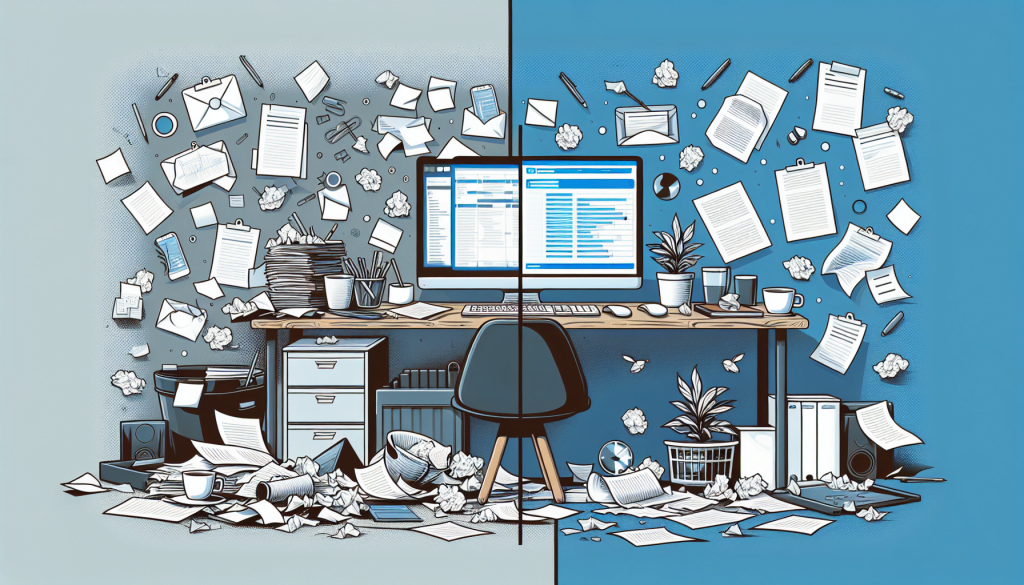Feeling overwhelmed by your to-do list? You’re not alone. Effective task management can be your secret weapon to lower stress levels. By organizing your tasks, prioritizing them, and managing your time wisely, you can reduce the pressure and anxiety that comes with a busy schedule. Intrigued? Let’s dive deeper into how this works.
Key Takeaways
- Clear goal setting in task management reduces overwhelm and enhances motivation.
- Prioritizing tasks focuses on high-value activities and reduces anxiety.
- Utilizing project management tools streamlines workflow and improves efficiency.
- Time management techniques like time blocking and delegation of responsibilities can significantly reduce stress.
- Maintaining a work-life balance and practicing stress management techniques are crucial.
- Effective communication within teams can help identify stressors early.
- Personalized time management strategies can enhance productivity and satisfaction.
- Implementing time management software can automate task management and reduce stress.
- Recognizing stressors and developing coping mechanisms are essential for stress management.
- Enhancing team collaboration can distribute workloads evenly and foster a supportive work environment.
Importance of Clear Goal Setting in Task Management
Reduces Overwhelm
Provides direction and focus
Clear goals provide a roadmap for your tasks. They give you a clear direction and focus, reducing the feeling of being overwhelmed. When you know exactly what you need to do, you can tackle your tasks with confidence and ease.
Clarifies objectives
Clear goals also clarify your objectives. They help you understand why you’re doing what you’re doing, which can motivate you to stay on track. When your objectives are clear, you’re less likely to get sidetracked by less important tasks.
Enhances Motivation
Sets achievable targets
Setting clear and achievable goals can boost your motivation. When you see that your goals are within reach, you’re more likely to put in the effort to achieve them. This can reduce stress by making your tasks feel more manageable.
Encourages progress tracking
Clear goals also encourage progress tracking. By monitoring your progress, you can see how far you’ve come and what you need to do next. This can reduce stress by giving you a sense of control over your tasks.

Prioritization of Tasks
Focus on High-Value Activities
Identifies critical tasks
Prioritizing tasks allows you to focus on high-value activities. By identifying the tasks that are most critical to your goals, you can ensure that your efforts are directed where they’re needed most.
Allocates appropriate resources
Prioritizing tasks also helps you allocate your resources appropriately. By focusing on high-value activities, you can ensure that your time and energy are not wasted on low-priority tasks.
Anxiety Reduction
Minimizes worry about uncompleted tasks
When you prioritize your tasks, you can reduce your anxiety about uncompleted tasks. By focusing on what’s most important, you can let go of the worry about less important tasks.
Makes workload manageable
Prioritizing tasks also makes your workload more manageable. By breaking down your tasks into manageable chunks, you can tackle them one at a time, reducing the stress of feeling overwhelmed.

Utilization of Project Management Tools
Streamlines Workflow
Integrates tasks and schedules
Project management tools can help streamline your workflow. They integrate your tasks and schedules, making it easier to keep track of what needs to be done and when.
Facilitates communication and collaboration
Project management tools also facilitate communication and collaboration. By keeping everyone on the same page, these tools can reduce the stress of miscommunication and confusion.
Efficiency and Deadline Management
Automates reminders and alerts
Project management tools can automate reminders and alerts. This can help you stay on top of your tasks and deadlines, reducing the stress of forgetting important tasks.
Reduces missed deadlines
By helping you manage your deadlines, project management tools can reduce the stress of missed deadlines. With automated reminders and alerts, you’re less likely to overlook important deadlines.

Time Management Techniques
Time Blocking
Dedicates specific hours to tasks
Time blocking is a time management technique that involves dedicating specific hours to specific tasks. This can help you stay focused and prevent multitasking, which can reduce stress.
Prevents multitasking and distractions
By dedicating specific hours to specific tasks, time blocking can prevent multitasking and distractions. This can help you stay focused and productive, reducing the stress of feeling overwhelmed.
Delegation of Responsibilities
Lightens individual workload
Delegating responsibilities can lighten your individual workload. By distributing tasks among team members, you can ensure that no one is overburdened, reducing stress.
Distributes tasks among team members
Delegation also promotes fairness and team spirit. By ensuring that tasks are distributed evenly, you can foster a collaborative culture and reduce stress through shared responsibilities.

Work-Life Balance and Stress Management
Importance of Regular Breaks
Prevents burnout
Taking regular breaks is crucial for preventing burnout. By giving yourself time to rest and recharge, you can maintain your productivity and reduce stress.
Refreshes mental state
Regular breaks also refresh your mental state. By stepping away from your tasks for a short while, you can return to them with a fresh perspective and renewed energy.
Mindfulness and Relaxation Practices
Incorporates meditation and deep breathing
Mindfulness and relaxation practices, such as meditation and deep breathing, can help reduce stress. By calming your mind and body, these practices can enhance your focus and productivity.
Enhances focus and reduces stress
Incorporating mindfulness and relaxation practices into your daily routine can enhance your focus and reduce stress. By taking time to relax and recharge, you can better manage your tasks and reduce stress.

Effective Communication in Teams
Early Identification of Stressors
Encourages sharing of concerns
Effective communication within teams can help identify stressors early. By encouraging team members to share their concerns, you can address issues before they escalate, reducing stress.
Allows for timely intervention
Effective communication also allows for timely intervention. By addressing stressors early, you can prevent them from becoming major issues, reducing stress.
Supportive Work Environment
Promotes team collaboration
A supportive work environment promotes team collaboration. By working together, team members can share the workload and support each other, reducing individual stress.
Reduces individual stress through collective support
A supportive work environment also reduces individual stress through collective support. By fostering a culture of mutual support, you can reduce stress and enhance team productivity.
Personalized Time Management Strategies
Development of Personal Strategies
Tailors methods to individual preferences
Developing personalized time management strategies can enhance your productivity and satisfaction. By tailoring methods to your individual preferences, you can work in a way that suits you best, reducing stress.
Enhances personal productivity and satisfaction
Personalized time management strategies can also enhance your personal productivity and satisfaction. By working in a way that suits you best, you can achieve your goals more effectively and enjoy your work more, reducing stress.
Education and Training
Offers time management workshops
Education and training can provide you with the skills you need for better task management. By offering time management workshops, you can learn new strategies and techniques, reducing stress.
Provides skills for better task management
Education and training can also provide you with the skills you need for better task management. By learning new strategies and techniques, you can manage your tasks more effectively and reduce stress.

Implementation of Time Management Software
Automation of Task Management
Simplifies scheduling and task allocation
Implementing time management software can automate task management. By simplifying scheduling and task allocation, you can reduce the time and effort required for planning, reducing stress.
Reduces manual planning efforts
Time management software can also reduce manual planning efforts. By automating task management, you can focus on your tasks instead of planning, reducing stress.
Stress Reduction Through Technology
Minimizes errors and oversights
Time management software can minimize errors and oversights. By providing a clear overview of tasks and deadlines, you can ensure that nothing is overlooked, reducing stress.
Provides a clear overview of tasks and deadlines
Time management software can also provide a clear overview of tasks and deadlines. By keeping everything in one place, you can easily see what needs to be done and when, reducing stress.
Strategies for Handling Stress Wisely
Recognition of Stressors
Identifies sources of stress
Recognizing stressors is crucial for stress management. By identifying the sources of your stress, you can implement preventive measures to reduce it.
Implements preventive measures
Recognizing stressors also allows you to implement preventive measures. By addressing the sources of your stress, you can prevent it from escalating, reducing stress.
Stress Management Techniques
Develops coping mechanisms
Developing coping mechanisms is crucial for stress management. By learning how to cope with stress, you can manage your tasks more effectively and reduce stress.
Utilizes effective task management to mitigate stress
Effective task management can also mitigate stress. By managing your tasks effectively, you can reduce the pressure and anxiety that comes with a busy schedule, reducing stress.
Enhancing Team Collaboration
Even Distribution of Workloads
Ensures no individual is overburdened
Enhancing team collaboration can ensure that workloads are distributed evenly. By ensuring that no individual is overburdened, you can promote fairness and team spirit, reducing stress.
Promotes fairness and team spirit
Enhancing team collaboration can also promote fairness and team spirit. By working together, team members can share the workload and support each other, reducing stress.
Fostering a Collaborative Culture
Encourages mutual support
Fostering a collaborative culture encourages mutual support. By supporting each other, team members can reduce stress and enhance productivity.
Reduces stress through shared responsibilities
A collaborative culture also reduces stress through shared responsibilities. By sharing the workload, team members can reduce the pressure on any one individual, reducing stress.
In conclusion, effective task management can significantly contribute to lower stress levels. By setting clear goals, prioritizing tasks, utilizing project management tools, implementing time management techniques, maintaining a work-life balance, communicating effectively within teams, developing personalized time management strategies, implementing time management software, recognizing stressors, and enhancing team collaboration, you can manage your tasks more effectively and reduce stress. So, why not give it a try? You might be surprised at how much of a difference it can make.
For more insights on stress management, check out our articles on practicing stress management techniques, the impact of mindfulness, and how people manage and adapt to stressful situations.
Unlocking Peace of Mind: How Task Management Lowers Stress – Your FAQ Guide
What is task management and how does it relate to stress reduction?
Task management is the process of organizing, prioritizing, and executing tasks efficiently. It involves planning out your day, week, or even month ahead to ensure that you’re focusing on the right tasks at the right time. Effective task management can significantly reduce stress by providing a clear roadmap of what needs to be done and when. This clarity helps to eliminate the overwhelm often caused by a seemingly endless to-do list, making it easier to focus and stay calm.
Can task management techniques vary, and if so, how?
Yes, task management techniques can vary widely depending on personal preferences, the nature of the work, and the specific goals of an individual or team. Some people might prefer digital tools like apps or software to keep track of their tasks, while others might find traditional methods like paper lists or planners more effective. Techniques can range from simple to-do lists to more complex systems like the Eisenhower Matrix, which prioritizes tasks based on urgency and importance, or the Pomodoro Technique, which breaks work into intervals for better focus and rest.
How does prioritizing tasks contribute to lower stress levels?
Prioritizing tasks helps to ensure that you’re focusing your time and energy on the most important and urgent tasks first. This not only increases your productivity but also significantly reduces stress by preventing last-minute rushes and the anxiety of potentially missing deadlines. Knowing that you’re tackling tasks in an order that makes sense can bring a sense of calm and control, which is crucial for maintaining low stress levels.
What role does delegation play in task management and stress reduction?
Delegation is key in task management, especially in a team setting. It involves assigning tasks to others who have the time or expertise to handle them more efficiently. Delegating tasks can drastically reduce your workload, thereby lowering stress levels. It’s important, however, to delegate tasks clearly and effectively, ensuring that the person taking over understands the requirements and deadlines to prevent any confusion or additional stress.
Can breaking down tasks into smaller, manageable parts help reduce stress?
Absolutely. Breaking down large tasks into smaller, more manageable parts can make them seem less daunting and more achievable. This approach not only makes it easier to start working on a task but also provides a sense of accomplishment as you complete each part. This can boost your motivation and reduce the feeling of being overwhelmed, which is a common source of stress.
How does setting realistic deadlines contribute to stress reduction?
Setting realistic deadlines is crucial for effective task management and stress reduction. Unrealistic deadlines can lead to unnecessary pressure and stress, as you rush to complete tasks in an impossible timeframe. By setting achievable deadlines, you allow for a more balanced workload and adequate time for rest, which is essential for maintaining low stress levels. It’s also important to communicate these deadlines clearly if you’re working in a team, to ensure everyone is aligned and can manage their workload effectively.
What impact does a clutter-free workspace have on task management and stress?
A clutter-free workspace can significantly impact task management and stress levels. A tidy and organized environment can help reduce distractions, making it easier to focus on the task at hand. This can lead to increased productivity and a sense of control over your work, which are key factors in reducing stress. Additionally, the act of organizing your space can also be a calming activity, further contributing to stress reduction.
How important is taking breaks, and how do they fit into effective task management?
Taking regular breaks is essential for effective task management and maintaining low stress levels. Breaks allow your mind to rest, recharge, and return to tasks with renewed focus and energy. Incorporating short breaks into your workday, such as stepping away from your desk, stretching, or going for a walk, can prevent burnout and reduce stress. The Pomodoro Technique is one example of a task management method that integrates breaks into the workflow, promoting both productivity and well-being.



